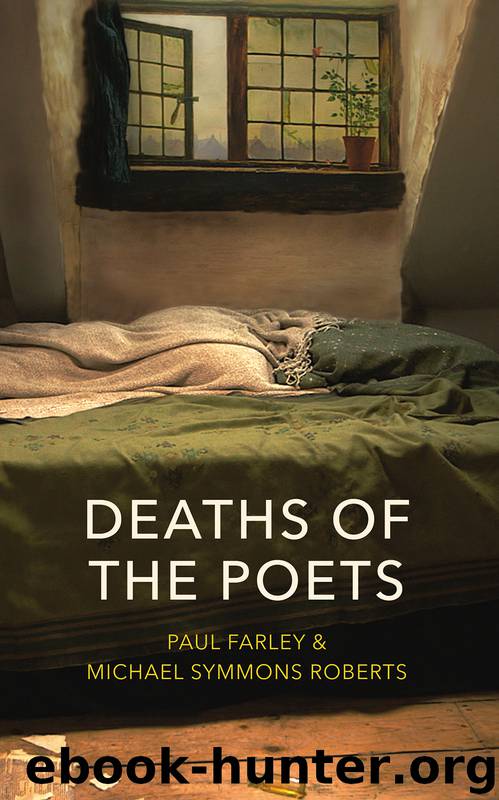Deaths of the Poets by Michael Symmons Roberts

Author:Michael Symmons Roberts
Language: eng
Format: epub
Publisher: Random House
It’s either the fridge, or the red wheelbarrow. Those are the two William Carlos Williams poems everyone knows. Two of the most perfect short poems ever written. They are like netsuke: intricately carved and small enough to hold in the palm of your hand. One describes the simplest of scenes, a wheelbarrow in a garden in the rain. But it places the redness of the wheelbarrow alongside the whiteness of the garden’s chickens, and prefaces this vignette with one of the most famous opening lines in twentieth-century poetry: ‘So much depends upon …’4
The equally famous fridge poem is just as perfect, but somehow more intimate, seems to tell us more about him. It reads like a short note, left on the kitchen table by a man for his spouse to read when she gets home. It’s an apology, for eating plums from the icebox. They were not just any plums. They were glorious, chilled and ripe, as perfect as the poem itself. He knew his wife was saving them for herself, but he couldn’t resist them. ‘Forgive me,’ he says. And, we assume, she did. Bill and Flossie married young and stayed married until he died in 1963 aged seventy-nine.
In his late play A Dream of Love Williams tells of a physician (Dr Thurber) who travels to New York and dies suddenly during extra-marital sex in a hotel room. He then comes back as a ghost to apologize to his devastated widow. It is the perfect nightmare for a male poet, combining as it does hypochondria, a death-wish, sex and guilt. Some biographers have suggested that Williams himself had affairs, and the New York connection seems to fit too.5 In Rutherford everyone knew him. He was a pillar of respectability. His parents lived around the corner. He could walk down the street and tip his hat to countless patients, former patients, children whose births he conducted, friends of his wife, friends of his kids. But in Manhattan he was the great Modernist poet, a doctor among the bohemians. Was it in the pull, the polarity of these two lives, these two selves, that he found the energy to write?
According to WCW’s biographer, Paul Mariani, he wrote A Dream of Love ‘to come to terms with his own feelings, to apologize for his momentary crazinesses in having slept with other women’.6
This push and pull between two vocations – the respectable doctor in Rutherford and the famous poet in New York – was powerful fuel for his work. In a late interview, Williams says that what keeps him interested in life, what gives him his zest and energy after so many years and so many achievements, is the look in a woman’s eyes.7
*
By all accounts Williams was good company. He and his wife were generous hosts to the many visitors – writers, journalists, scholars – to their house on Ridge Road at the height of his literary fame. The genes for hospitality seem to have been passed on intact, because his granddaughter Daphne Williams Fox knows how to make English visitors feel welcome.
Download
This site does not store any files on its server. We only index and link to content provided by other sites. Please contact the content providers to delete copyright contents if any and email us, we'll remove relevant links or contents immediately.
The Universe of Us by Lang Leav(15068)
The Sun and Her Flowers by Rupi Kaur(14509)
Adultolescence by Gabbie Hanna(8918)
Whiskey Words & a Shovel II by r.h. Sin(8008)
Love Her Wild by Atticus(7749)
Smoke & Mirrors by Michael Faudet(6183)
Wiseguy by Nicholas Pileggi(5769)
The Princess Saves Herself in This One by Amanda Lovelace(4966)
Love & Misadventure by Lang Leav(4842)
Memories by Lang Leav(4795)
Milk and Honey by Rupi Kaur(4741)
Bluets by Maggie Nelson(4547)
Too Much and Not the Mood by Durga Chew-Bose(4337)
Pillow Thoughts by Courtney Peppernell(4271)
Good morning to Goodnight by Eleni Kaur(4231)
The Poetry of Pablo Neruda by Pablo Neruda(4097)
Algedonic by r.h. Sin(4056)
HER II by Pierre Alex Jeanty(3605)
Stuff I've Been Feeling Lately by Alicia Cook(3448)
